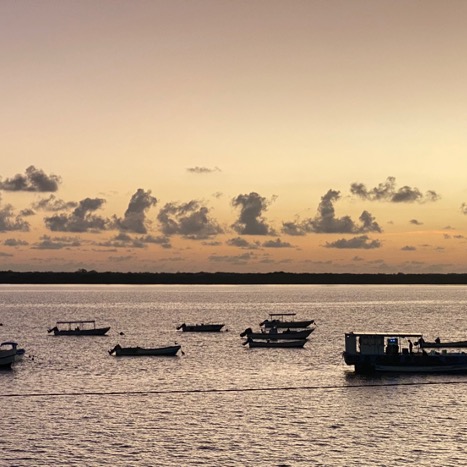Collaboration
A fundamental goal of our project was to develop non-extractive modes of research. Collaborating closely with the community-based organisation Lamu Youth Alliance was central to this commitment to produce transformative work.
Collaborating in mixed teams helped countering colonial roles and inherited hierarchies, such as that between researchers and researched.
Our collaboration opened important doors for research. But more importantly, the relationships and networks of the researchers fundamentally shaped our ways of working as well as the outcomes of our research.
"In our initial week in Lamu we built rapport with the Lamu Youth Alliance members through city walks, group discussions, meditation sessions, and shared dinners. These interactions allowed us to understand our research partners better and also helped us identify our collective skill sets and learning objectives for the upcoming weeks."
"In our initial week in Lamu we built rapport with the Lamu Youth Alliance members through city walks, group discussions, meditation sessions, and shared dinners. These interactions allowed us to understand our research partners better and also helped us identify our collective skill sets and learning objectives for the upcoming weeks."

In Lamu, NGOs operate across various sectors, including youth empowerment, cultural heritage preservation, environmental conservation, healthcare, and more. The proliferation of NGOs in Lamu shape on-site power dynamics and guest-host relationships from the outset.
The prevalence of numerous NGOs significantly influences how the local population perceives researchers. Given the consistent presence of researchers and their anticipated inquiries, many interviewees have rehearsed responses, having shared their stories repeatedly.
Consequently, one of the primary challenges encountered during the research was access to more personal perspectives and experiences. Kenya's intensive development research industry made it challenging to steer conversations towards more personal narratives. Additionally, navigating the expectations and interests of multiple stakeholders, including the students, the Lamu Youth Alliance, and the wider community, was not without its challenges.
"Reaching a consensus on research topics and outcomes that harmonised with all parties proved challenging initially. LYA understandably sought research outcomes that could directly benefit the community, prioritising practical results like policy recommendations and reports on matters already significant to the organisation. Even though this initially appeared daunting, considering our brief six-week stay and limited research experience as students, it ultimately proved successful, with both parties content with the selected topics."
"Reaching a consensus on research topics and outcomes that harmonised with all parties proved challenging initially. LYA understandably sought research outcomes that could directly benefit the community, prioritising practical results like policy recommendations and reports on matters already significant to the organisation. Even though this initially appeared daunting, considering our brief six-week stay and limited research experience as students, it ultimately proved successful, with both parties content with the selected topics."
“Each Lamu Youth Alliance member had different skills, which were matched to complement the skills of the University of Basel students. Each gave their best. That's how it worked. The roles and distribution of tasks were fair since everyone was tasked with what was best to them.”
- LYA Member



